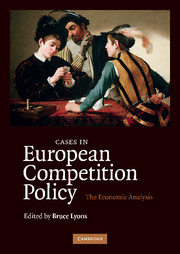Book contents
- Frontmatter
- Contents
- Contents by potentially anticompetitive business practices
- Contents by markets
- List of figures
- List of tables
- List of contributors
- Preface
- Introduction: the transformation of competition policy in Europe
- A Anticompetitive behaviour by firms with market power
- B Agreements between firms
- Introduction
- B.1 Cartels
- B.2 Other horizontal agreements
- B.3 Vertical agreements
- 9 Efficiency enhancing or anticompetitive vertical restraints? Selective and exclusive car distribution in Europe
- 10 Beer – the ties that bind
- 11 Parallel trade of prescription medicines: the Glaxo Dual Pricing case
- C Mergers
- Bibliography
- Index
10 - Beer – the ties that bind
Published online by Cambridge University Press: 05 June 2012
- Frontmatter
- Contents
- Contents by potentially anticompetitive business practices
- Contents by markets
- List of figures
- List of tables
- List of contributors
- Preface
- Introduction: the transformation of competition policy in Europe
- A Anticompetitive behaviour by firms with market power
- B Agreements between firms
- Introduction
- B.1 Cartels
- B.2 Other horizontal agreements
- B.3 Vertical agreements
- 9 Efficiency enhancing or anticompetitive vertical restraints? Selective and exclusive car distribution in Europe
- 10 Beer – the ties that bind
- 11 Parallel trade of prescription medicines: the Glaxo Dual Pricing case
- C Mergers
- Bibliography
- Index
Summary
‘You're walkin’ tough baby, but you're walkin' blind to the ties that bind'
Bruce SpringsteenIntroduction
It started with the Beer Orders (1989). A watershed decision was made by the Law Lords in July 2006. For one man, Bernie Crehan, this was the culmination of a fifteen-year episode in the pub trade, in which he has made legal history as the first UK case of damages for breach of competition law being awarded by a court. Possibly hundreds of other cases hung on their Lordships' decision and Nomura, the Japanese bank that took over the chain called Inntrepreneur, had a total potential liability of £100 million. And it all concerns Article 81, vertical agreements and the price of a pint of beer.
In 1989, the UK Monopolies and Mergers Commission (MMC) published its lengthy and long-awaited report on beer. The Commission ‘… recommended measures that eventually led brewers to divest themselves of 14,000 public houses. The MMC claimed that their recommendations would lower retail prices and increase consumer choice. There is considerable doubt, however, that their objectives were achieved’ (Slade, 1998, 565). In its report, the MMC noted rising real prices of beer and seized upon the power of the then big six brewers exercised through their considerable tied estates as being a prime motor. Consequently, it recommended that the ties be substantially cut.
- Type
- Chapter
- Information
- Cases in European Competition PolicyThe Economic Analysis, pp. 245 - 267Publisher: Cambridge University PressPrint publication year: 2009
- 1
- Cited by



